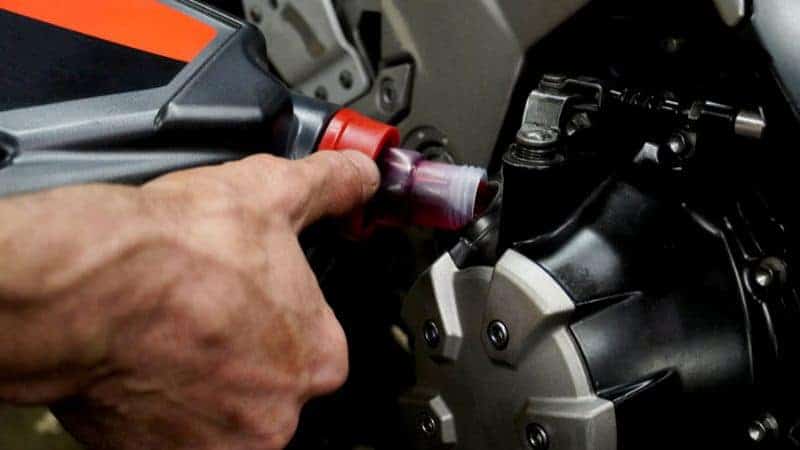Can A Motorcycle Use Car Engine Oil? – (Mechanic Thoughts)
In the world of motorcycle maintenance, the question of whether you can substitute car engine oil for motorcycle-specific oil is as common as it is controversial.
We’ve all been there – standing in the garage, staring at a motor oil bottle, and wondering, “Will this work just for motorcycles too?”
As a seasoned mechanic, I’ve been on the front lines of this debate, witnessing firsthand the effects of such choices on motorcycles.
In this article, I’m about to lay all the cards on the table, dissecting the intricacies of engine oils and demystifying the mechanics behind our choices.
So, can a motorcycle use car engine oil? No, you should never put car engine oil into your motorcycle because the viscosity and additives of motorcycle engine oil differ from cars. A motorcycle uses a wet clutch system, which requires balanced frictional characteristics and should lose its viscosity at high engine RPM and extreme heat.

Table of Contents
Is Car Engine Oil the Same As Bike?
The frictional characteristic of motorcycle engine oil is different from that of cars. In cars, the engine and clutch plate are available at different places, while the motorcycle shares the same cabinet. Also, the car has a dry clutch plate, but the motorcycle uses a wet clutch system for power transmission.
So, the same oil lubricates the engine piston and clutch plates in the motorcycles. Hence, a balanced frictional characteristic is required for motorcycle engine oil.
- Differences in Additives and Formulations:
Motorcycle engine oils are formulated with specific additives that cater to the unique needs of motorcycles. Motorcycles typically have wet clutches, meaning the clutch is bathed in engine oil.
The additives in motorcycle oils are designed to work with these wet clutches, providing the necessary friction for optimal performance.
On the other hand, car engine oils may contain additives and friction modifiers that are great for car engines but can be detrimental to the performance of a motorcycle’s wet clutch, potentially leading to clutch slippage.
- Viscosity and Temperature Performance:
Motorcycles tend to operate at higher temperatures and RPMs compared to cars. Therefore, motorcycle oils are formulated to maintain optimal viscosity and lubrication under these extreme conditions.
Using car engine oil, which may not perform as well under high temperatures, could result in inadequate lubrication and potential engine damage.
- Shear Stability:
Motorcycle engines, gearboxes, and clutches share the same oil. This creates a shearing action on the oil, which can break down its viscosity over time. Motorcycle oils are designed to be more shear-stable to withstand this action.
Car engine oils may not offer the same level of shear stability, which could lead to faster degradation of the oil and reduced engine protection.
If you use car engine oil in a motorcycle, power loss may occur from the clutch system to the drivetrain, giving your motorcycle lower MPG. (I have written a detailed guide on motorcycle MPG; you can read that)
That’s why it’s not recommended to use car engine oil to lubricate the motorcycle engine. You should only use your manufacturer’s specified engine oil in your motorcycle.
What Is The Difference Between Motorcycle Oil And Motor Oil?
The oil sump size of the motorcycle is much smaller than that of cars and trucks. So, it contains less oil to cool down the moving parts and engine.
Generally, the oil sump capacity of a motorcycle is 3 to 5 liters, while in cars and trucks, the sump capacity is 8 to 16 liters.
It means motorcycle engine oil should have a higher heat dissipation rate to keep the engine cool and protect it from wear and tear. Hence, it should have higher heat conduction properties for fast dissipation.
Also, the same engine oil lubricates the clutch system and gearbox, which means it should have a balanced frictional characteristic that prevents power loss.
That’s not the case with motor oil used in cars and trucks. Because cars and trucks have higher sump capacity, and it has separate gearbox and clutch system that doesn’t require lubrication.
Also, the viscosity of motorcycle engine oil is different from motor oil used in cars and trucks because it should be formulated to travel smoothly through narrower pathways and protect the moving parts from oxidation and corrosion.
What Will Happen If You Use Car Engine Oil in Motorcycle?
The viscosity and frictional characteristics of motorcycle engine oil are balanced so that it won’t cause power loss.
At the same time, car engine oils contain friction modifiers, which could lead to slipping and power loss on acceleration.
Also, modern car engine oils require less viscosity. So, using low-viscosity oil in your motorcycle may not protect your geartrain and other moving components from wear and tear, which could lead to engine failure.
Will Car Oil Ruin Your Motorcycle Engine?
If you’re thinking of top-up your motorcycle with your car engine oil, then don’t make this mistake! Using car oil on your motorcycle may ruin your motorcycle gearbox and clutch system because your motorcycle shares the same oil for engine lubrication and clutch plates.
Conclusion
The frictional characteristics and viscosity of motorcycle engine oil differ from motor oil. That’s why companies like Valvoline and Castrol sells separate oil for car and motorcycle. You should never replace your motorcycle engine oil with general motor oil because it can ruin your gearbox and clutch plates.





